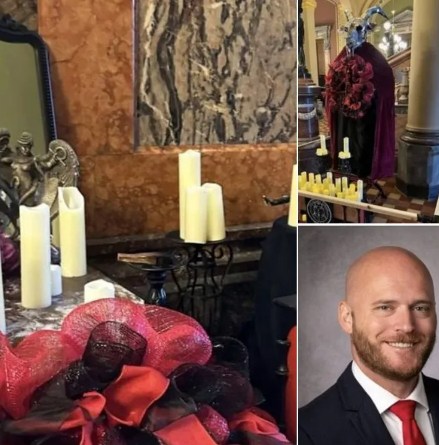
An ex-Navy pilot, Michael Cassidy, sparked significant controversy after he decapitated a goat-headed installation organized by the local Satanic Temple at the Iowa State Capitol. Describing himself as a “conservative Christian” from Mississippi, Cassidy stated that he was “offended” by the display of the Baphomet altar, which he viewed as a symbol of darkness. He urged others to “embrace Jesus Christ” instead.

The Incident at the Capitol
In December 2023, Cassidy, a former Republican candidate, entered the Iowa State Capitol and expressed shock that the legislature allowed the Satanic Temple to exhibit the Baphomet statue. He labeled it a “blasphemous statue” and, driven by what he termed “righteous indignation,” decided to remove its head, placing it in a garbage bag. Cassidy then reported the act to security, where he received a citation.
Legal Consequences and Reactions
Mortimer Adramelech, a minister with the Satanic Temple of Iowa, emphasized the importance of equal rights for all religions in the public sphere under the First Amendment. The Iowa Department of Administrative Services confirmed that the Satanic Temple met the necessary requirements for their display. Initially charged with third-degree criminal mischief, a felony under Iowa’s hate crime statutes, Cassidy saw the felony charges dropped by May 2024. He ultimately received a misdemeanor judgment, resulting in a fine without jail time. In response to the outcome, Cassidy tweeted, “Not today, Satan.”
Public Opinion on Cassidy’s Actions
Reactions to Cassidy’s actions were polarized. Some condemned his behavior as a “hate crime,” likening it to vandalism against sacred spaces, while others praised him for standing up against what they perceived as offensive symbolism. One supporter commented, “It is time for us to take a stand against these kinds of symbols. Bravo sir… May you be exonerated and walk away a free citizen.” Cassidy acknowledged the mixed responses during an interview with the Christian Broadcasting Network, stating that some anonymous supporters recognized his stance against what they view as societal degradation.
The Broader Implications
This incident raises questions about religious expression, public displays, and the boundaries of free speech in a pluralistic society. As discussions around such symbols and actions continue, the community grapples with balancing respect for diverse beliefs while addressing concerns about hate and intolerance.

An ex-Navy pilot, Michael Cassidy, sparked significant controversy after he decapitated a goat-headed installation organized by the local Satanic Temple at the Iowa State Capitol. Describing himself as a “conservative Christian” from Mississippi, Cassidy stated that he was “offended” by the display of the Baphomet altar, which he viewed as a symbol of darkness. He urged others to “embrace Jesus Christ” instead.

The Incident at the Capitol
In December 2023, Cassidy, a former Republican candidate, entered the Iowa State Capitol and expressed shock that the legislature allowed the Satanic Temple to exhibit the Baphomet statue. He labeled it a “blasphemous statue” and, driven by what he termed “righteous indignation,” decided to remove its head, placing it in a garbage bag. Cassidy then reported the act to security, where he received a citation.
Legal Consequences and Reactions
Mortimer Adramelech, a minister with the Satanic Temple of Iowa, emphasized the importance of equal rights for all religions in the public sphere under the First Amendment. The Iowa Department of Administrative Services confirmed that the Satanic Temple met the necessary requirements for their display. Initially charged with third-degree criminal mischief, a felony under Iowa’s hate crime statutes, Cassidy saw the felony charges dropped by May 2024. He ultimately received a misdemeanor judgment, resulting in a fine without jail time. In response to the outcome, Cassidy tweeted, “Not today, Satan.”
Public Opinion on Cassidy’s Actions
Reactions to Cassidy’s actions were polarized. Some condemned his behavior as a “hate crime,” likening it to vandalism against sacred spaces, while others praised him for standing up against what they perceived as offensive symbolism. One supporter commented, “It is time for us to take a stand against these kinds of symbols. Bravo sir… May you be exonerated and walk away a free citizen.” Cassidy acknowledged the mixed responses during an interview with the Christian Broadcasting Network, stating that some anonymous supporters recognized his stance against what they view as societal degradation.
The Broader Implications
This incident raises questions about religious expression, public displays, and the boundaries of free speech in a pluralistic society. As discussions around such symbols and actions continue, the community grapples with balancing respect for diverse beliefs while addressing concerns about hate and intolerance.
